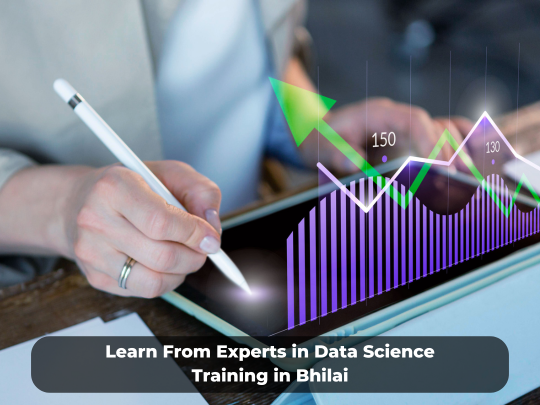- robingilll295
- Aug 19, 2024
- 6 min read

Bhilai, a city historically known for its massive steel production and industrial capabilities, is at a pivotal moment in its evolution. As the world shifts towards a digital-first approach in almost every sector, Bhilai must embrace data science to stay competitive and sustainable. Data science, with its ability to analyze vast amounts of information and generate actionable insights, can be the catalyst that propels Bhilai into a new era of industrial efficiency and urban development. This article explores how data science can drive this transformation, touching on its impacts on industry, urban infrastructure, governance, healthcare, and education.
The Role of Data Science in Bhilai’s Industrial Transformation
Bhilai's identity has long been tied to its industrial roots, particularly in steel manufacturing. However, as industries around the world adopt advanced technologies like artificial intelligence (AI), machine learning (ML), and the Internet of Things (IoT), Bhilai's industrial sector must evolve to maintain its edge. Data science is central to this evolution, offering tools to optimize production, reduce waste, and enhance decision-making.
Predictive Maintenance and Process Optimization
In Bhilai’s industrial landscape, downtime due to equipment failure can lead to significant losses. Predictive maintenance, powered by data science, allows industries to predict and prevent equipment failures before they occur. Machine learning algorithms can identify patterns that signal an impending breakdown by analyzing data from sensors and historical maintenance records. This not only reduces downtime but also extends the life of machinery and saves costs on repairs.
Beyond maintenance, data science can optimize industrial processes by analyzing production data to identify inefficiencies and bottlenecks. For example, steel production involves complex chemical and mechanical processes that can be fine-tuned using data-driven insights. By optimizing these processes, industries can achieve higher yields, reduce energy consumption, and minimize waste.
Supply Chain and Inventory Management
Effective supply chain management is crucial for industrial success. Data science can enhance this aspect by providing real-time insights into inventory levels, demand forecasts, and logistics. With predictive analytics, companies can anticipate changes in demand and adjust their inventory accordingly, reducing the risk of overproduction or stockouts.
Furthermore, data-driven logistics can optimize transportation routes and schedules, reducing delivery times and lowering transportation costs. This is particularly important for Bhilai, where the efficient movement of raw materials and finished goods is key to sustaining its industrial output.
3. Sustainability and Energy Management
As global attention shifts towards sustainability, Bhilai's industries must also adapt to reduce their environmental impact. Data science can play a significant role in this transition by optimizing energy usage and reducing waste. For instance, smart grids powered by data analytics can manage energy distribution more efficiently, ensuring that resources are used where they are needed most.
Additionally, data science can help industries monitor their carbon footprint and identify areas where they can reduce emissions. This not only benefits the environment but also helps companies comply with increasingly stringent environmental regulations. Learn more about the data science course in Bhilai
Urban Development: Bhilai’s Path to a Smart City
As Bhilai evolves, its urban infrastructure must also adapt to meet the needs of a growing and increasingly digital population. Data science offers the tools to create a smart, efficient, and sustainable urban environment that can support both the industrial sector and the residents who depend on it.
Smart Infrastructure and Traffic Management: Urban infrastructure in Bhilai must be designed to accommodate growth while minimizing congestion and environmental impact. Data science can be used to develop smart infrastructure that is responsive to the city's needs. For example, traffic management systems that use real-time data from sensors and cameras can dynamically adjust traffic signals to optimize flow and reduce congestion.
These systems can also provide real-time information to commuters, helping them choose the fastest routes and avoid traffic jams. This not only improves the efficiency of the transportation network but also reduces pollution and fuel consumption, contributing to a cleaner, healthier city.
Sustainable Urban Planning: As Bhilai grows, urban planning must be data-driven to ensure that resources are used efficiently and that development is sustainable. Data science can help city planners analyze patterns in population growth, land use, and environmental factors to make informed decisions about where to build new infrastructure.
For instance, data analytics can identify areas that are prone to flooding or other environmental risks, allowing planners to avoid these areas or take preventive measures. Similarly, by analyzing data on public transportation usage, planners can optimize routes and schedules to better serve the community.
Smart Utilities and Resource Management Data science can also improve the management of utilities such as water, electricity, and waste disposal. Smart grids, powered by data analytics, can balance energy supply and demand, reducing outages and improving reliability. Water management systems can use data to detect leaks, monitor consumption, and optimize distribution networks, ensuring that water is used efficiently and that shortages are minimized.
In waste management, data-driven solutions can optimize collection routes and schedules, reducing operational costs and ensuring that waste is disposed of in an environmentally friendly manner.
Enhancing Governance and Public Services
For Bhilai to fully realize its potential as a smart city, governance and public services must also embrace data science. By making data-driven decisions, the government can improve efficiency, transparency, and responsiveness, creating a better environment for both businesses and residents.
Data-Driven Decision Making: Data science enables governments to make more informed decisions by providing insights into the needs and preferences of the population. For example, by analyzing data on public service usage, the government can identify areas where services need to be improved or expanded. Predictive analytics can also help anticipate the impact of policy changes, allowing for more proactive governance.
Moreover, data-driven decision-making promotes transparency by making data publicly available. This allows citizens to see how decisions are made and hold the government accountable for its actions.
Citizen Engagement and Smart Services Engaging with citizens is crucial for effective governance, and data science can facilitate this by providing platforms for feedback and interaction. For example, digital platforms can be used to collect feedback from residents on public services, which can then be analyzed to identify areas for improvement.
Additionally, smart services such as online portals for paying bills, accessing public records, or reporting issues can make it easier for residents to interact with the government. These services can be enhanced with AI and data science to provide personalized recommendations and streamline processes.
Public Safety and Emergency Response: Data science can also improve public safety by enhancing emergency response systems. For instance, predictive analytics can identify crime hotspots, allowing law enforcement to allocate resources more effectively. In the event of a natural disaster or other emergencies, data-driven models can predict the impact and help coordinate response efforts, ensuring that help reaches those in need as quickly as possible.
Revolutionizing Healthcare and Education
The transformation of Bhilai into a smart city requires advancements in healthcare and education, two sectors crucial for the population's well-being and development. Data science can revolutionize these sectors by improving outcomes, increasing access, and making services more efficient.
Smart Healthcare Systems: Data science can significantly enhance healthcare in Bhilai by enabling predictive analytics, personalized medicine, and efficient resource management. Predictive models can analyze health data to identify at-risk populations and implement preventive measures, such as targeted health campaigns or early intervention programs.
Personalized medicine, powered by data science, tailors treatment plans to individual patients based on their genetic information, lifestyle, and medical history. This approach not only improves patient outcomes but also makes healthcare more efficient by reducing the need for trial-and-error treatments.
Furthermore, data analytics can optimize hospital operations, such as patient flow, staff scheduling, and inventory management. This reduces costs and improves the quality of care by ensuring that resources are used where they are needed most.
Data-Driven Education Education is a key pillar of Bhilai’s future, and data science can play a crucial role in enhancing the learning experience. Learning analytics can provide insights into student performance, helping educators identify areas where students need additional support.
Adaptive learning platforms, powered by AI and data science, can provide personalized learning experiences tailored to each student’s needs. This ensures that students receive the support they need to succeed, regardless of their learning style or background.
Moreover, data science can inform curriculum development by analyzing job market trends and skill requirements. This ensures that educational programs are aligned with the needs of the economy, preparing students for the jobs of the future.
Conclusion: A Vision for Bhilai’s Future
Bhilai’s transformation from an industrial powerhouse to a smart city represents a significant opportunity to build a more sustainable, efficient, and prosperous urban center. By placing data science at the heart of this transformation, Bhilai can optimize its industrial operations, improve urban infrastructure, enhance public services, and build a healthier, more educated population.
However, realizing this vision will require a concerted effort from all stakeholders, including the government, industry, academia, and the community. Building the necessary infrastructure, fostering a data-driven culture, and ensuring data governance will be key to Bhilai’s success.
As Bhilai embraces data science, it stands to not only preserve its industrial heritage but also set a new standard for smart urban development in India. By reimagining its future with data science at its core, Bhilai can secure its place as a leader in the digital age, creating a smarter, more connected, and more resilient city for future generations.
Kickstart your career by enrolling in this Data Science Certification Bhilai
Navigate To:
NO-8 and 9,Sadhana Complex,Maitri Nagar,Risali, Bhilai 490006
Email: bhilai@360digitmg.com
Phone:+91 98866 28363/ +91 99816 17903

